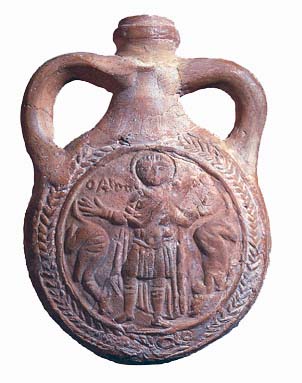Image Details

British Museum
With St. Mena’s blessing. Pilgrims to the shrine of St. Menas, in Abu Mina, Egypt (southwest of Alexandria), may have used this flask to carry home oil from lamps burning in the saint’s tomb or holy water from a nearby sacred spring. Although little is known about the third- to fourth-century martyr, the flask depicts him as a Roman soldier, wearing high boots, a short belted tunic and a long chlamys, or woolen cloak, over his shoulders; two kneeling camels flank the saint. Dating from the fourth to seventh centuries, Menas flasks were manufactured locally to accommodate those Christian pilgrims who made Menas’s tomb one of the most frequented Byzantine shrines.
The similarity of the flasks’ inscriptions—“We receive the blessing of Saint Menas” or simply “Of Saint Menas”—to those found on contemporaneous slipper lamps—“Of the Mother of God” or “Of Saint Elias”—leads author Magness to argue that the lamps, like the flasks, must be associated with individual Byzantine shrines.
